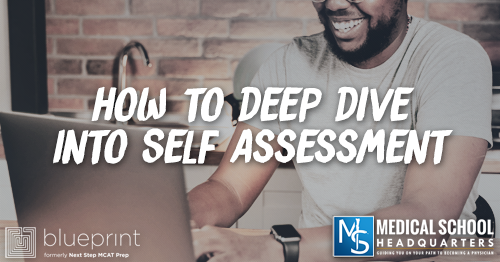Apple Podcasts | Google Podcasts

Session 19
In today’s episode, Ryan and Bryan talk about stress management and how to not worry so much about everything that’s going on in the premed life. Stress is a physiological thing that can impact your cognitive performance. Listen in as they lay down the ways to help you manage your stress while preparing for the MCAT.
Here are the highlights of the conversation between Ryan and Bryan:
How do you reduce stress in your life?
Stress Management Level I – Managing Life Stress
- Exercise everyday.
Daily aerobic exercise reduces your stress levels and has an enormous positive impact on cognitive performance. People who get exercise are also less likely to get Alzheimer’s disease or degenerative diseases. They perform higher on IQ and memory tests.
- Yoga
Yoga has very serious medical and physiological benefits that can help improve how you manage your stress levels.
- Mindfulness meditations
Spend 15-20 minutes a day doing some very simple meditation. Read on different meditation techniques and give your brain the time it needs to breathe. If you’re not able to manage stress well on the prep process, then you’re not going to be able to manage stress well on test day itself.
Stress Management Level II – Managing the Test Day Experience
- Get yourself used to the experience of the full exam.
Be familiar with what is going to exactly happen on test day. Sign up for a free account at www.nextstepmcat.com, which includes Lesson One where Bryan gives a thorough step-by-step rundown of what happens on test day. The more you know what’s exactly coming on test day, the less stressful it becomes.
- Take full-length practice tests.
Simulate the MCAT full-length exam. Take it like the real exam. Go to a library. Don’t take it at home. Start it at the same time of day and stick very strictly to the timing schedule. The more you can simulate the real MCAT and test day will become less of a stressor because you know exactly what you’re getting yourself into.
Stress Management Level III – Test Day
- Use this breathing technique to disrupt the panic response.
When a stressor question pops up, don’t panic. Panic is either an absence of thought or an excess of unproductive cognition. So you have to disrupt it physically by guessing on that question that is stressing you out. Go to the next passage. Put the pencil down. Take your head off the mouse. Close your eyes and take three slow, deep breaths. (Listen in to learn about this breathing technique.)
Links and Other Resources:
Blueprint MCAT (formerly Next Step Test Prep)
Transcript
Introduction
Dr. Ryan Gray: The MCAT Podcast, session number 19.
A collaboration between the Medical School Headquarters and Blueprint MCAT (formerly Next Step Test Prep), The MCAT Podcast is here to make sure you have the information you need to succeed on your MCAT test day. We all know that the MCAT is one of the biggest hurdles as a premed, and this podcast will give you the motivation and information that you need to know to help you get the score you deserve so you can one day call yourself a physician.
Now this podcast is going to be a fun one, a little bit different. We’re not going to talk about test strategies or any sort of content, though that is coming in the next couple weeks. We’re going to talk about some fun stuff, so let’s dive in.
Alright Bryan, we’re going to talk about some touchy feely subject here, and talk about stress management, and how to not worry so much about everything that’s going on in a premed’s life. And for me obviously on the other side of everything, and you as well having gone to medical school but not completing it, you’ve been there, done that. How can we tell the premed student how to reduce their stress in their life?
How Premed Students Can Manage Stress
Bryan Schnedeker: Yeah Ryan, this topic is one that’s near and dear to my heart because it’s so important for good preparation, and I think the misconception that so many students have is kind of what you had said right at the beginning there like, ‘Oh I don’t need this new age nonsense, right? I don’t need to put a healing crystal on my chakra to help me perform better on the MCAT.’ But I love kind of being able to fix these preconceptions that students have, tell them about stuff that really matters that maybe they weren’t aware of before. And stress isn’t a touchy feely thing, it’s a physiological thing, right? Like your body has a certain set of hormonal neurological responses to stress that have a vast impact not only on your health but on your cognitive performance. So the first thing I tell everybody when I start with a new tutoring student, I tell them their first homework assignment is to go to the gym every day because aerobic exercise- daily aerobic exercise reduces your stress levels, increases the kind of positive hormones running around your body, and most importantly has an enormous positive impact on cognitive performance. And this isn’t touchy feely stuff, this is hard science, right? They’ve shown that people who get exercise are less likely to get Alzheimer’s or other degenerative diseases, they perform higher on tests of IQ and memory, and they have reduced stress levels. So aerobic exercise has to be part of your daily regimen if you’re going to be taking the MCAT prep seriously. Get out and walk the dog, play some soccer, play some tennis, go for a jog, whatever it is you can do to get your body moving, get your pulse rate up, that will actually help your MCAT performance. Then of course there’s the non-aerobic stuff, and this maybe is going in a little more into the touchy feely direction but it still matters a lot. So there’s things like yoga. I think it sometimes gets held out as a joke, but it does actually again have very serious medical physiological benefits that can help improve how you’re able to manage your stress levels, and how you’re able to perform better while doing your MCAT prep. I know it’s become something of a fad lately so I feel a little silly even saying this, but the other huge one is mindfulness meditation. And on a little short podcast like this we don’t have time to go into real huge depth about it, but there’s a million and one things in resources out there for meditation techniques that students can have access to, and it’s another thing where I always tell students, ‘Look you need to spend fifteen or twenty minutes a day doing some very, very simple just sit in a chair and breathe slowly. Or take it much more than that, go read up on different meditation techniques and give your brain the time that it needs to breathe.’ Because if you don’t manage stress well in the prep process, then you are absolutely not going to manage stress well on test day itself, which is of course this ludicrously stressful experience. So that’s the kind of step one of stress management, is just doing what you can to mitigate the stress for the four months leading up to test day. The next layer of stress management is getting yourself used to the experience of a full exam, and being familiar with exactly what’s going to happen on test day. So at www.NextStepMCAT.com we let students sign up for a free account, and that free account includes lesson one in our video lesson course for free, and in that lesson I give a very thorough step-by-step rundown of what actually happens on test day. You know literally walking the student through, ‘Okay then they’re going to ask you to turn your pockets inside out. Then they’re going to do this. Then they’re going to do that.’ And the more you know exactly what’s coming on test day, the less it becomes a matter of being stressed out and freaking out about what’s coming. Because you know, ‘Oh just like Bryan said, they’re going to use the metal detector wand on me, then they’re going to do the fingerprint scan, then they’re going to do this, then they’re going to do that.’ And of course the other component of that is taking full length practice tests. And I say this, Ryan you’ve heard me talk about this probably every other week, right I always say that you have to simulate the MCAT and full length exams is a huge part of that. Treat them like the real exam. Don’t take them at home, go to a library, start at the same time of day, stick very strictly to the timing schedule. The more you can simulate the real MCAT, the more the real MCAT is no longer a big stressor because you’ve been there before, you’ve seen it, you’ve done it so you know exactly what you’re getting yourself into, right? So stress management level one is just managing kind of life stress for the four months leading up to the MCAT. Stress management level two is managing the test day experience, right? Not being freaked out by anything that comes with taking the test. And then finally level three is during the test itself, while you’re actually in the middle of a section and managing it, what do you do if you hit like a crazy hard problem, or some wacky passage you’ve never seen before and you’re starting to freak out a little bit? You’ve got to manage that, right? I mean that’s a major stressor. A passage pops up with a question and you’re just like, ‘Oh my God.’
Dr. Ryan Gray: You slam your mouse on the table, that’s what I would do.
Bryan Schnedeker: Yeah I would slam my head on the keyboard. Right, yeah just flip the table. Storm out.
Dr. Ryan Gray: Yes, walk out.
Bryan Schnedeker: There you go.
Dr. Ryan Gray: That would work.
Bryan Schnedeker: I actually saw that happen once. I’ve taken the MCAT a whole bunch of times in my career, but one of the times I did that, some kid just sort of had a big huff and walked out and didn’t come back in.
Dr. Ryan Gray: That’s awesome.
Bryan Schnedeker: Yeah he clearly didn’t take the Next Step course because he didn’t know what was coming.
Dr. Ryan Gray: And he probably wasn’t able to void his test either.
Bryan Schnedeker: Yeah I mean I guess they just record it as like an anomaly or something. I don’t know, yeah. Don’t do that, right don’t be that guy. So the thing about stress during the exam itself, like what do you do when you hit panic level stress? And fundamentally panic is going to be one of two things depending on the kind of person you are. Panic is either going to be a total absence of thought, right? You just stare at it and your brain just shuts down entirely. That kind of just like, ‘Uhh,’ like that’s your internal monologue. Or alternatively, panic is excessive unproductive thought. So your brain starts spinning a mile a minute, yet you’re thinking- a million of just, ‘Oh my God, I don’t know what is this? What is that diagram? I don’t even recognize that unit! Oh my God I’m going to tank this, I’m going to tank the whole MCAT, my life is over. I’m never going to be a doctor! God!’ So either one of those, right a total absence of thought or an excess of unproductive cognition, you have to disrupt it. So you said slam the mouse on the table, the funny thing is you’re not that far off, right? You need to physically disrupt that stressful panic reaction. So what you need to do in that moment is whatever the thing is that’s stressing you out, just guess on that question. If it’s a passage, guess on all four or five questions, go to the next passage, put the pencil down, take your hand off the mouse, close your eyes, and take a couple of deep breaths. And what you do in that moment is very, very simple. You take a deep breath in, you hold it, and while you’re holding that breath you tense up all the muscles in your feet and your legs. Your quads, your glutes, curl up your toes, hold your breath, tense all the muscles in your legs until you’re shaking, until you’re desperate to take another breath. And then slowly exhale while relaxing your feet. Do that again with your hands. Take a deep breath in real slow, while you’re breathing in tense up your hands. Pull it in, tense up your hands, tense up your arms, hold it until your muscles are shaking and then blow out, relax your hands. And do it one more time, third time. Breathe in, tense up all the muscles in your face. Scrunch your eyes, tense up your neck, clench your jaw until your whole face is red and shaking. And then breathe out, relax all the muscles in your face. Now you feel a little silly but look, nobody’s watching, nobody cares that you’re having to go through this little regime.
Dr. Ryan Gray: That felt good though, I just did that, that felt good.
Bryan Schnedeker: Exactly, three breaths, literally three slow breaths. We’re talking twenty seconds tops, and you can disrupt that panic response, interrupt the panic stress response that you’re having. And remember you can do very well on the MCAT even if you have to guess on lots of questions. This isn’t like a college midterm where you have to get 95% of the questions right to get an A, right? You can get 30% – 40% of the questions wrong and still get a comfortably above average score. So there’s no reason to panic just because you’re getting a few questions wrong, right? Give yourself that tool, that technique to break up that stress panic response, and it’ll allow you to continue to move forward and succeed on the exam.
Final Thoughts
Dr. Ryan Gray: Alright there you have it. Take some deep breaths, do some stretching, some exercise. All about stress management. Next week we are going to talk about what to expect on your test day. Until next week, keep pushing forward in your MCAT prep, and if you aren’t doing any MCAT prep and you were looking to do some MCAT prep, go check out www.NextStepMCAT.com. Use the code MCATPOD, that’s all capitals, MCATPOD to save some money on your Blueprint MCAT (formerly Next Step Test Prep) test prep materials. That’s a lot of ‘test prep’ in one sentence I think. Anyway www.NextStepMCAT.com, use the code MCATPOD all capitals to save some money. That’s a discount code only here on the podcast. I hope you join us next week here at The MCAT Podcast, and go check out everything else we’re doing at Med Ed Media for the Old Premeds Podcast, and our longest running show, The Premed Years. Have a great week, we’ll see you next week.
SEARCH SITE
SEARCH SITE
LISTEN FOR FREE











